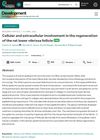 April 2011 in “한국생물공학회 학술대회”
April 2011 in “한국생물공학회 학술대회” Lotion with fucoidan from brown seaweed improved skin and reduced allergy symptoms in mice with dermatitis.
 353 citations,
February 2022 in “Nature Immunology”
353 citations,
February 2022 in “Nature Immunology” Long-haul COVID can cause lasting symptoms affecting many body systems and may be linked to ongoing inflammation and immune system issues.
286 citations,
August 2007 in “Journal of Clinical Investigation” Alopecia areata is an autoimmune disease where T cells attack hair follicles.
276 citations,
April 2003 in “Molecular endocrinology” Vitamin D is important for bones, hair, blood pressure, and breast development.
182 citations,
November 2018 in “Cosmetics” Seaweeds have beneficial compounds for skin care, including anti-aging and protective effects.
133 citations,
July 2020 in “Cells” Creating fully functional artificial skin for chronic wounds is still very challenging.
119 citations,
June 2021 in “Heliyon” Licorice has many health benefits but should be used carefully due to possible side effects.
106 citations,
January 2013 in “Clinical and Developmental Immunology” Alopecia areata is caused by immune system attacks on hair follicles, often triggered by viral infections.
91 citations,
January 2010 in “Journal of Allergy and Clinical Immunology” NK cells play a role in skin diseases like eczema and psoriasis.
 73 citations,
April 2019 in “Experimental Dermatology”
73 citations,
April 2019 in “Experimental Dermatology” The scalp's microorganisms significantly affect hair health and disease.
 61 citations,
June 2022 in “Journal of Controlled Release”
61 citations,
June 2022 in “Journal of Controlled Release” Dissolving microneedles show promise for delivering medication through the skin but face challenges like manufacturing complexity and regulatory hurdles.
61 citations,
October 2011 in “Experimental dermatology” Scalp itching is common and hard to diagnose due to the complex nerve structure of the scalp.
58 citations,
November 2018 in “Cochrane library” Oral isotretinoin may slightly improve acne but increases the risk of side effects like dry lips and skin; more research is needed to understand its full risks and benefits.
58 citations,
January 2010 in “Arthritis Care & Research” Hydroxychloroquine may help delay skin damage in lupus patients.
 56 citations,
March 2015 in “Journal of Investigative Dermatology”
56 citations,
March 2015 in “Journal of Investigative Dermatology” Healthy mitochondria in skin cells are essential for proper hair growth and skin cell interaction in mice.
55 citations,
October 2019 in “The journal of allergy and clinical immunology/Journal of allergy and clinical immunology/The journal of allergy and clinical immunology” The review suggests that other immune cells besides CD8+ T cells may contribute to alopecia areata and that targeting regulatory cell defects could improve treatment.
 54 citations,
January 2023 in “Signal Transduction and Targeted Therapy”
54 citations,
January 2023 in “Signal Transduction and Targeted Therapy” New therapies are being developed that target integrin pathways to treat various diseases.
54 citations,
June 2018 in “Nutrients” Early diagnosis and a strict gluten-free diet are crucial for children with celiac disease to improve symptoms.
 50 citations,
February 2022 in “Nanomaterials”
50 citations,
February 2022 in “Nanomaterials” Nanomaterials show promise in improving wound healing but require more research on their potential toxicity.
50 citations,
May 2021 in “Frontiers in immunology” Certain immune cells contribute to skin autoimmune diseases, and some treatments can reverse hair loss in these conditions.
45 citations,
August 2018 in “Haematologica” Macrophage iron release is crucial for hair growth and wound healing.
 44 citations,
October 2019 in “International Journal of Molecular Sciences”
44 citations,
October 2019 in “International Journal of Molecular Sciences” Melatonin, usually known for sleep regulation, also has antioxidant properties that can protect skin, stimulate hair growth, and improve skin conditions, with topical application being more effective than oral use.
 40 citations,
November 2019 in “Frontiers in Endocrinology”
40 citations,
November 2019 in “Frontiers in Endocrinology” Metabolic Syndrome is linked to several skin conditions, and stem cell therapy might help treat them.
40 citations,
September 2019 in “World journal of clinical cases” An elderly man's hair grew back after a treatment that transferred healthy gut bacteria.
40 citations,
October 2012 in “Dermatologic clinics” More research is needed to understand the genetic causes of Alopecia areata to develop better treatments.
 39 citations,
April 1992 in “Development”
39 citations,
April 1992 in “Development” Both cell and non-cell parts are important for rat whisker follicle regrowth.
38 citations,
November 2020 in “International journal of biochemistry & cell biology” Keratin proteins are essential for keeping the cells in the human colon healthy and stable.
37 citations,
December 2021 in “Cells” Alopecia areata severity and treatment response are linked to specific cytokine levels.
 36 citations,
October 2021 in “Frontiers in Endocrinology”
36 citations,
October 2021 in “Frontiers in Endocrinology” Insulin resistance and high male hormone levels are major causes of Polycystic Ovary Syndrome.
36 citations,
December 2014 in “F1000 prime reports” The document concludes that Hidradenitis suppurativa is often underdiagnosed, lacks definitive treatment, and requires better awareness and management strategies.











